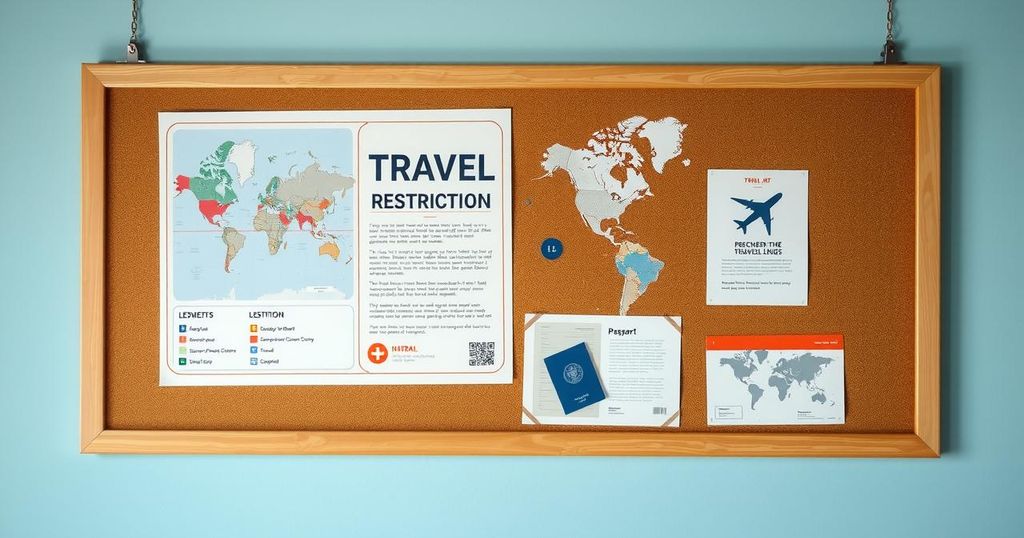Trump Issues New Travel Ban Affecting Nearly 20 Countries: What Travelers Need to Know

President Donald Trump has enacted a new travel ban that prohibits or limits entry from nearly 20 countries due to national security concerns. The ban includes nations such as Afghanistan and Iran and aims to address high visa overstay rates. Travel restrictions will take effect in June 2025, with exemptions for some visa holders. Travelers should seek information from official sources regarding their entry eligibility.
In a major shift in immigration policy, President Donald Trump has signed a new travel proclamation that affects nearly 20 nations. This sweeping travel ban stems from national security concerns and aims to restrict entry for foreign nationals from various countries. Specifically, it bars entry from Afghanistan, Burma, Chad, Republic of Congo, Equatorial Guinea, Eritrea, Haiti, Iran, Libya, Somalia, Sudan, and Yemen.
Additionally, nations such as Burundi, Cuba, Laos, Sierra Leone, Togo, Turkmenistan, and Venezuela also face travel suspensions. The White House has stressed that this decision targets countries with high visa overstay rates and those that do not meet adequate screening and vetting protocols.
Many are drawing parallels between this new ban and the controversial restrictions enacted in 2017 under Trump’s administration, which many referred to as the “Muslim ban.” This previous prohibition faced backlash, resulting in legal challenges and widespread protests. Former President Joe Biden repealed the ban during his administration, labeling it a “stain on our national conscience.”
For those impacted by this latest ban, there are some exceptions to note. Lawful permanent residents, current visa holders, and specific visa categories, as well as individuals whose entry aligns with U.S. national interests, may still gain entry, although details on those conditions remain unspecified.
International travelers from the affected countries should prepare for potential disruptions. Individuals seeking tourist, work, or student visas might experience delays or even denials. While some in the U.S. may find it possible to renew their visas, the path to reentry could prove to be more complicated.
This new travel ban aligns with one of Trump’s campaign promises for the 2024 election and comes on the heels of a recent antisemitic incident in Colorado. In a post on Truth Social, Trump commented on the attack, stating it exemplified the urgent need for secure borders and the deportation of illegal individuals he views as anti-American.
So, which nationals are specifically barred from entering the U.S.? The complete ban applies to the following twelve countries: Afghanistan, Myanmar, Chad, Republic of the Congo, Equatorial Guinea, Eritrea, Haiti, Iran, Libya, Somalia, Sudan, and Yemen. Meanwhile, those from Burundi, Cuba, Laos, Sierra Leone, Togo, Turkmenistan, and Venezuela face partial restrictions.
These travel restrictions set to kick in at 12:01 a.m. ET on June 9, 2025, as reported by NBC News. As restrictions tighten, travelers from openly banned countries may face boarding denials by airlines or be turned away upon arrival. In contrast, those from partially restricted countries might undergo enhanced scrutiny.
For individuals who have already purchased tickets to travel from the affected nations, it is advisable to consult airlines and the nearest U.S. embassy or consulate for the latest information. While they can expect entry denial, those from partially restricted nations could still travel, although they may need to navigate additional requirements.
The ongoing situation has travelers scrambling for clarity. They are encouraged to stay informed by reviewing the U.S. Department of State’s guidance and seeking advice from immigration attorneys to address concerns about their eligibility under this new travel ban.
This sweeping travel ban, signed by President Trump, restricts entry from nearly 20 countries for national security reasons. It largely mirrors the controversial measures taken in 2017 but includes exceptions for certain individuals. While the full ban takes effect in June 2025, travelers from impacted countries ought to consult relevant authorities regarding visa status and entry protocols. With the increasing uncertainty, it is crucial for affected individuals to stay informed and seek professional advice.
Original Source: www.usatoday.com








